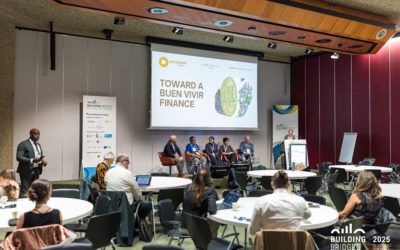Building Bridges without crossing them ? Convergences and contradictions in the Swiss sustainable finance movement
15 January 2025, Switzerland – Self-regulation isn’t working, and the Swiss banks still don’t have a transition plan or follow UN recommendations, write the members of the BreakFree collective, who were invited to Building Bridges.
Building Bridges 2024 repeated the exercise. No Sergio Ermotti or Ueli Maurer alone on the podium, assuming their thinly veiled opposition to any credible climate strategy, as had been the case in previous editions. Instead, Mary Robinson, Johan Rockström and Xiye Bastida reiterated the urgency of the situation and pointed out that several “planetary limits” had been crossed, before an audience of bankers, asset managers and insurers from BlackRock, Lombard Odier, UBS, Pictet, Zurich and many others.
The “bridges” that the architects of the initiative have been building from the outset aim to link the financial community active in Switzerland with the United Nations system. The most significant step forward is the partnership with the United Nations Environment Programme Finance Initiative (UNEP-FI), which has chosen to hold its annual Round Table here.
On the eve of a new Trump administration, the attempt at convergence is of keen interest. Aware of the stakes, Patrick Odier hammered home the idea that the movement “moving in the right direction” is, in the long term, “unstoppable”, while the UN executives emphasized the “multipolarity” of the world or the advances made by central banks in Europe, Brazil and Mexico.
Insufficient self-regulation in climate finance
However, this marriage of convenience juxtaposes two highly contradictory visions of climate finance.
On the one hand, Lombard Odier, Pictet, Zurich and UBS all praise the “Swiss way”, based on self-regulation, transparency of sustainability practices and “good examples” of ESG financing and “Investing with the Environment”.
highlighting “good examples” of ESG financing and “Impact Investing”. On the other, representatives of the United Nations Task Force on Net Zero Policy and the European Central Bank’s Climate Change Centre put forward figures to show that self-regulation is failing to curb the worsening climate crisis, and called for the introduction of binding regulations.
And for good reason: in Switzerland, it’s not even close. Between 2021 and 2023, UBS provided a further USD 12.5 billion to oil and gas companies, even though it has set itself a target of reducing its financed emissions by 70% by 2030, with no detailed timetable for reducing its financing [Reclaim Finance, Nov. 2024]. Worse still, the bank is reported to have decided to scuttle the roadmap Credit Suisse had set itself to clear its exposure to thermal coal [Bloomberg, March 7, 2024]. What’s more, the vast majority of UBS Asset Management’s votes at the 2024 AGMs supported the direction of the largest fossil fuel developers [Reclaim Finance, Dec. 2024].
Pictet, for its part, manages USD 9.7 billion in fossil fuel assets, a significant proportion of which is invested in companies seeking new deposits or building new extractive infrastructure, far from any credible transition plan [Urgewald, 2024]. Neither Pictet nor UBS has an announced, systematized engagement strategy.
Contradictions that need to be addressed
These choices trample underfoot the recommendations of the Task Force on Net Zero, for whom “a Net Zero commitment must contain intermediate targets (including targets for 2025, 2030 and 2035) [and] should include specific targets to end [the] support of fossil fuels”, clarify and condition any commitment strategy; or “not compromise” climate policies through lobbying [Task Force on Net Zero Policy, Nov. 2024].
By not debating these contradictions, the Building Bridges movement cannot achieve its targets, which include systemic, co-constructed change. Yet it is only at this price that sustainable finance will become transformative and unstoppable.
Olivier de Marcellus and Guillaume Durin, BreakFree Switzerland



